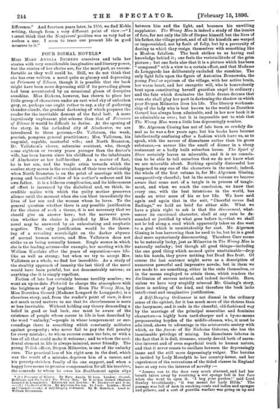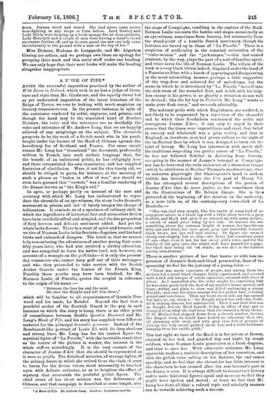FOUR DISMAL NOVELS.*
Miss MARY ANGELA DICKENS conceives and tells her stories with very considerable imaginative and literary power, bat the stories of her choice are, for the most part, as uncom- fortable as they well could be. Still, we do not think that she has ever written a novel quite so gloomy and depressing as Prisoners of Silence, though it is possible that the book might have been more depressing still if its pervading gloom had been accentuated by an occasional gleam of deceptive sunshine. Miss Dickens, however, has chosen to place her little group of characters under an east wind sky of unbroken grey, or, perhaps one ought rather to say, a sky of gathering thunder-cionds, the gradual darkening of which prepares the reader for the inevitable descent of the fatal bolt. A more ingeniously unpleasant plot scheme than that of Prisoners of Silence it would be difficult to devise. At the opening of the story, in the cathedral city of Alnchester, we are introduced to three persons,—Dr. Vallotson, the weak, peevish, pompous general practitioner ; Mrs. Vallotson, his ungenial, capable, masterful wife; and North Branston, Dr. Valloteon's clever, saturnine assistant, who, though some eighteen or twenty years younger than the doctor's wife, has been known since his childhood to the inhabitants of Alnchester as her half-brother. As a matter of fact, he is her son, and the tragic crisis towards which the sombre story moves is the revelation of their true relationship when North Branston is on the point of marriage with the young and beautiful widow of his mother's seducer and his own father. It is a hideous complication, and its hideousness of effect is increased by the diabolical and, we think, in- credible malice with which the guilty mother preserves silence until the moment when she can blast immediately the lives of her son and the woman whom he loves. To the general question whether there is any possible justification for the choice of such a theme, it is not necessary that we should give an answer here ; but the narrower ques- tion whether its choice is justified by Miss Dickens's novel may be answered by an unhesitating and emphatic negative. The only justification would be the throw- ing of a revealing search-light on the darker abysses of normal human nature, and Mrs. Vallotson does not strike us as being normally human. Single scenes in which she is the leading actress—for example, her meeting with Sir William Karslake after the years of separation—are life- like as well as strong ; but when we try to accept Mrs. Vallotson as a whole, we find her incredible. As a study of the stealthy approach of insanity the last third of the novel would have been painful, but not demonstrably untrue; as anything else it is simply repellent.
Fiction of late has certainly become terribly sombre ; we want an up-to-date Pickwick to charge the atmosphere with the brightness of gay laughter. Even The Wrong Man, by Miss Dorothea Gerard (Madame Longard de Longgarde), is a cheerless story, and, from the reader's point of view, it does not much mend matters to see that its cheerlessness is more sr less inevitable. Without holding any theory demanding a belief in good or bad luck, one must be aware of the existence of people whose career in life is best described by the word " unlucky,"—people in whose temperament or sur- roundings there is something which constantly militates against prosperity ; who never fail to pay the full penalty for every mistake ; to whom success comes too late, or with a lose of all that could make it welcome; and to whom the acci- dental element in life is always inimical, never friendly. The young Polish officer, Stepan Milnovics, is one of the unlucky ones. The practical loss of his right arm in the duel, which was the result of a mistake, deprives him of a career, and his poverty-stricken family of its one support, and when a happy love seems to promise compensation for all his troubles, the comrade to whom he owes his disablement again slips • (1.1 Prisnnsrs of Silence. By Mary Angela Di kens. London : Osgood, McIlvaine and 0o.—(2 ) The Wrong Man. By D relies Gerard (Madame Longard de Loneivarde). Edinburgh and London W. Blackwood and Sens. —,3.) the Sport of Stars By Algernon Ole lag. In I vol.. London : Beret mai 1-lackett..—(4.) A Soli-Denying ordinance. By M. Hamilt..n. Loud n: William Heinemann. between him and the light, and becomes his unwilling supplanter. The Wrong Man is indeed a study of the ironies
of fate, for not only the life of Stepan himself, but the lives of his father, the village priest, and of all his kinsfolk are warped or impoverished, not by fault of folly, but by a perversity of destiny to which they resign themselves with something like a Moslem fatalism. The book strikes us as having real knowledge behind it; one feels the verisimilitude of the grim picture ; but one feels also that it is a picture which has been " composed" with a view to a certain effect, and that Madame de Longgarde has deliberately excluded the sunshine. The only light falls upon the figure of Antonina Brunowska, the
young Pani or squiress of the village. with her active brain, her warm heart, and her energetic will, who is benovolently
bent upon constituting herself guardian angel in ordinary ; and the fate which dominates the little drama decrees that even she shall play her part in darkening the shadow in which poor Stepan Milnovics lives his life. The literary workman-
ship of the lady who is best known to the world as Dorothea Gerard has always been admirable, and in her new book it is as admirable as ever; but it is impossible not to wish that The Wrong Man were a little less depressingly sombre.
Mr. Algernon Gissing has not of late been so crudely die.
mal as he was a few years ago; but his books have become intellectually confusing after a fashion which leave us, so to speak, with the savour of dismalness rather than its gross
substance,—a savour like the smell of dinner in a cheap restaurant or a badly built suburban house. The Sport of Stars certainly leaves us miserable, and it is no consola-
tion to be able to tell ourselves that we do not know what we are miserable about. Nothing specially distressful has happened to any one of the characters in the novel; indeed, the whole of the first volume is, for Mr. Algernon Gissing,
comparatively cheerful; but in the second volume we become aware that some sort of a tangle is in process of tangle- ment, and when we reach the conclusion, we know that every one, with the best intentions in the world, has made an utter mess of his or her life. We have said again and again that in the snit, " Cheerful versus Sad Endings," we hold no brief for either side. What we have a plain right to ask is that the denouement, what-
soever its emotional character, shall at any rate be de- manded or justified by what goes before it,—tbat we shall not be led along a road which apparently takes us due west to a goal which is unmistakeably far east. Mr. Algernon Gissing is less harrowing than he used to be, but he is a good
deal more mysteriously disconcerting. Theodore Carr seems to be naturally lucky, just as Milnovics in The Wrong Man is naturally unlucky; but though all good things—including
the one good thing which seemed quite unattainable—drop into his hands, they prove nothing but Dead Sea fruit. Of course the last sentence might serve as a description of numerous powerful and impressive novels; but in them we are made to see something, either in the ends themselves, or in the means employed to attain them, which renders the disillusion of success natural, and indeed inevitable. Here, unless we have very stupidly misread Mr. Gissing's story, there is nothing of the kind, and therefore the book lacks intellectual and imaginative justification.
A Self-Denying Ordinance is not dismal in the ordinary sense of the epithet, for it has much more of the riotous than the lacrymose, and it ends in the cheerful, old-fashioned way
by the marriage of the principal masculine and feminine characters—a highly born card-sharper and a by-no-means prepossessing hoyden of the middle-classes, who, it must be adiritted, shows to advantage in the aristocratic society with
which, as the fiancee of Sir Nicholas Osborne, she has the inestimable privilege of mixing. Its dismalness inheres in
the fact that it is dull, tiresome, utterly devoid both of narra- tive interest and of even superficial truth to human nature, and that it never ceases to oscillate between the depressingly inane and the still more depressingly vulgar. The heroine is invited by Lady Meredyth to her country-house, and her experiences of the recreations of the titled classes in England have at any rate the interest of novelty :-
"Joanna ran to the door very much alarmed, and had her breath taken away by receiving a wet sponge full in her face when she went to open it. beg your pardon ! ' said Lord Hawley breathlessly ; 'it was meant for Lady Hilda! The passage was full of men in smoking-coats and ladies and sponges and pillows, and a sort of guerilla warfare was going on up and
down. Joanna stood and stared. She had never come across bear-fighting in any shape or form before. Lord Dawley and Lady Hilda were keeping up a brisk sponge fire at close quarters, Lady Meredyth and a couple of men were having a hand-to-hand encounter further off, and as Joanna gazed she saw one lady come incontinently to the ground with a man on the top of her."
Miss Dickens, Madame de Longgarde, and Mr. Algernon Gissing are artists, and we perhaps owe them an apology for grouping their work and this sorry stuff under one heading. We can only hope that their next books will make the heading altogether inappropriate.



































 Previous page
Previous page